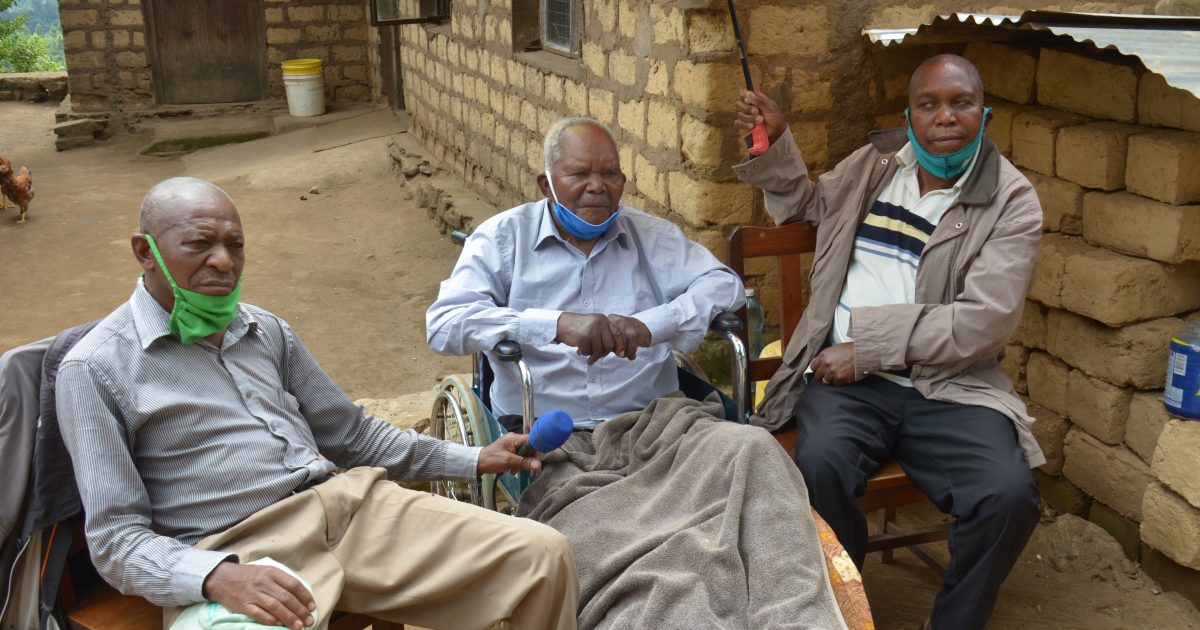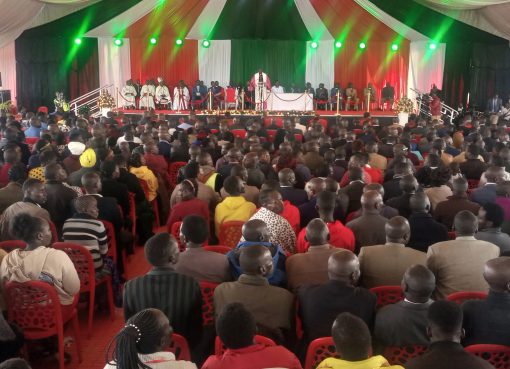Seated on a wheelchair under the eaves of his house in Lushangonyi village at the foot of the towering Iyale Rock in Wundanyi, Mzee Haman Mwandighi radiates a quaint calmness of a man at peace with himself. His eyes are most striking; slightly rheumy but still retains a fierce steely glint at their depth.
They are eyes of a man who has lived through the horrors of war. His head, a crown of dense hair, is peppered with white. The face though unlined is spotted with black warts and his once imposing physique has significantly shrunk with age.
Aged 100-years, the grand old man is the embodiment of tranquility. The gray towel draped lovingly over his legs to block the sun completes the idyllic image of a man who has reconciled with his past. When he speaks, his voice is remarkably firm. He is aware of the frailty of human life yet he remains remarkably unafraid.
“I am the only one left. We were several of us but everyone is gone except me,” he mumbles in a slightly husky voice.
Mwandighi is the last of the Mghange greats; the sole surviving veteran who valiantly fought in the Second World War against the Germans between 1941 and 1945 in Abyssinia; the modern-day Ethiopia. He was only 21 when he was enlisted to fight for the Queen in a foreign land.
Details of his conscription into Her Majesty’s (HM) Forces including fingerprints are contained in a tattered booklet that is falling from many years of handling despite painstaking efforts to keep it from becoming decrepit. The words are faded and smudged from accidental spillages. Still, they are legible allowing us to take a peek into the incredible past life of man who turned a century-old this year.
According to his military pass, Mwandighi was enlisted on 6th January 1941 and got discharged on 29th November 1945. He had served for four years and 299 days. By the time of his discharge, Haman Mwandighi, whose regimental number was 14970, had been promoted to the rank of a Sergeant.
Recollecting the exact details from a bloody war campaign that took place nearly 80-years ago is a near- impossible feat for this grand centenarian. However, in a truly soldier spirit of not giving up, he dredges up scant but amorphous details of his exploits in the war.
“I was a carpenter but was sometimes assigned a job to drive soldiers at the front line,” he recalls.
Born in 1920, he attended missionary-run Bura Mission School in Mwatate in the 1930s before proceeding to Kabete Technical College for an artisan course between 1938 and 1939. With the threat of looming war, British started recruiting gifted and skilled technical students in the 1940s.
Mwandighi, an excellent carpenter, was amongst the first to be picked. He was to build houses, bunkers, workshops and hangers for the soldiers. He later received military training at Embakasi before A. Jollet, a white medical officer, declared him physically fit to join the war. After his training, he was taken to Mombasa port by train and shipped to Abyssinia.
As a master builder, he spent over four years working alongside Italian prisoners to put up military barracks, houses and military structures. Sometimes, he would drive reinforcements to the battlefront to fight the Germans. Only on a few occasions was he involved in direct combat. The accounts of such engagements remain fuzzy and disconnected owing to age-induced memory lapses.
Occasionally, Mzee reminisces of his war exploits and mimics the cocking and aiming of a rifle as would a sniper.
“I was a crack shot,” he says with a distant smile. His military character was declared as good and upon discharge he returned to home to a heroes’ welcome.
Mr. Vernant Mwandighi, his son aged 63, says his father never tired of serving his community. After the war, he discloses that Mzee Mwandighi was appointed as the first councilor for Mwanda under the African District Council.
“He was a member of ADC both before and after independence,” says the son. His father was amongst the confidants of Jomo Kenyatta when the first president was hiding in Kenyatta Caves from colonial authorities.

He adds that even after the discharge, his father used his carpentry skills to help build many factories including the first coffee factory in the region.
In his twilight years, Mwandighi suffers from sporadic bouts of memory losses. He is confined to a wheelchair after his right leg was amputated. The family says he picked a foreign bug during the war. It started as a strange wound on his right leg that festered that he had to be hospitalized for six months in 2016. The toes were cut off to halt a creeping rot and later the entire leg was amputated following doctors’ recommendation.
“He picked the strange disease from long ago in the war,” insists the son.
Mr. Ephrain Kitimo, retired senior chief and a former army man, says Mzee Mwaluka is the last of the great war heroes. By 2002, Mr. Kitimo had located 25 other war veterans after years of searching for them all over the county. The veterans he found had served in Burma, South Africa and Abyssinia.
“He is the last one of the twenty-five veterans we had in this county. All the rest are gone,” he said.
The ex-chief who is an official of the local chapter of Defense Forces Comrades Association (Defoca) explained that Mwaluka got sh 600 during his discharge; a princely sum at that time. During their lifetime, these veterans were receiving a stipend from their counterparts in Britain.
“They fill a financial assistance form and get some money from a kitty created by Britain’s war veteran,” he said.
After the death of a war hero, this financial help can only be extended to his spouse if she got married to a soldier within six years after the end of war. Currently, only one widow continues to receive the stipend in the entire county.
By Wagema Mwangi





